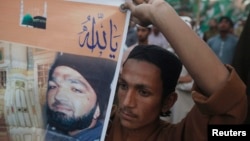Pakistan’s highest court on Wednesday upheld the death sentence of a man convicted of killing a provincial governor for criticizing the country’s controversial blasphemy law.
The case dates to 2011 when a Christian woman was accused of insulting Islam and given the death sentence. The governor of Pakistan’s populous Punjab province at the time, Salman Taseer, sought a presidential pardon for the woman, Asia Bibi. He also called for reform of the controversial blasphemy law.
His remarks provoked a strong backlash from Pakistan’s Islamic groups. Days later, Taseer was assassinated by one of his official bodyguards, Mumtaz Qadri, who confessed to his crime saying under the dictates of Islam he was bound to kill the governor for insulting the religion.
A special anti-terrorism court sentenced Qadri to death. The ruling outraged Islamists and security concerns prompted the judge to flee Pakistan with his family.
Defense lawyers appealed to the Supreme Court, where Wednesday a three-member panel upheld the verdict against Qadri.
Human rights activists like Tahira Abdullah have hailed the court ruling.
“They have upheld the principle of not condoning anyone taking the law into their own hands, and doing a vigilante killing or doing an extra-judicial killing, and hiding under the pretext that blasphemy is against Islam,” she said.
Activists insist the blasphemy law is often used to settle personal disputes, particularly in rural parts of Pakistan. Angry mobs or religious fanatics in the country have killed dozens of people over allegations of blasphemy in recent years.
Under pressure from Islamic fundamentalists, such killers have either remained at large or escaped punishment. But activists say Wednesday's court ruling could bring an end to that practice.
The judicial order comes at a time when Pakistan has intensified a crackdown on Islamist groups known for inciting sectarian and extremist violence in the country.









